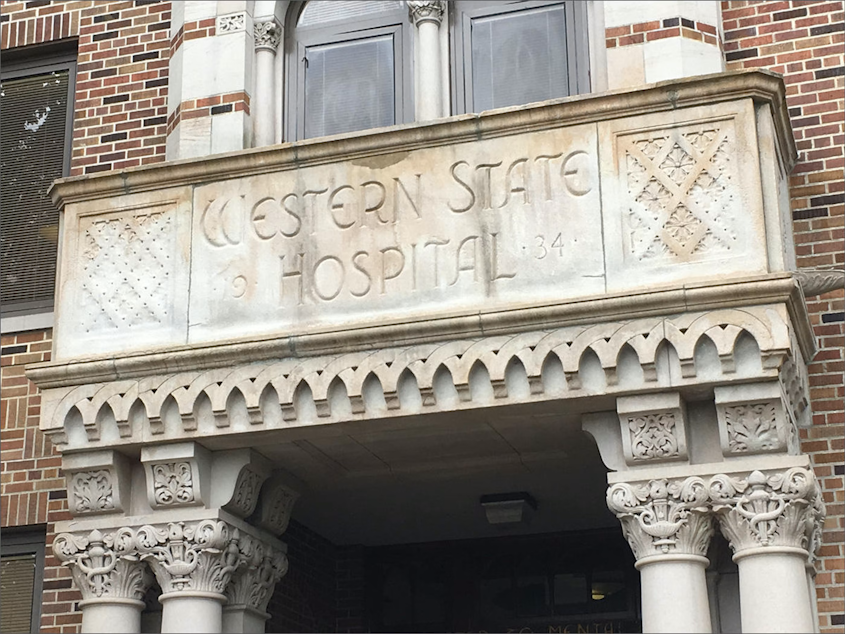State leaders pledged to transform WA's mental health system by 2023. That hasn't happened

In 2018, Governor Jay Inslee, hospital officials, and state lawmakers stood outside of Western State Hospital in Lakewood.
They were there to make an announcement about a bold new approach to mental health care.
Western State had been mired in controversy at that time. The 800-plus bed facility had seen high profile escapes, turnover at top positions, and had struggled to keep its federal accreditation.
Inslee announced that by 2023, Western State would exclusively serve people who were incarcerated; the state would instead build smaller facilities to serve people who weren’t facing charges, but were committed by civil courts.
Well, it’s now 2023 and The Seattle Times reports that the state hasn't met that goal. Esmy Jimenez wrote about the state’s progress towards their mental health care goals.
In 2018, the Western State was serving two types of patients: those coming from jails, and people who qualified for involuntarily commitment via civil court on the basis of a disability or illness. Patients coming from jails were typically considered incompetent to stand trial, and Western State provided services to try and restore that competency, Jimenez explained.
Around that time, the hospital also faced patient-on-patient assaults and patient-on-staff assaults. The possibility of losing accreditation, and thus millions in federal dollars also loomed over Western State.
Sponsored
The facility was also the defendant in a class action lawsuit known as True Blood.
"The short of that lawsuit was state officials are not getting people in jail access to mental health services; they're violating these people's due process rights because they're just waiting there pre-trial, before [they're] ever able to actually get any help," Jimenez said.
But prior to all of that, in 2016, Washington state legislators assembled a special committee to address persistent problems at Western State. After convening several times and leaning on the input of consultants, the committee put out a report containing nine recommendations for restoring order at Western State, Jimenez said.
"A couple of the main ones were ... let's make sure that they actually focus on and prioritize the forensic patients, the people that are coming from jails. The civil folks will actually go to long-term civil commitment facilities in local communities, rather than traveling to Western — they can be taken care of in King County, or Snohomish, or Yakima County, because we will build small facilities there for them."
The committee also recommended building three mobile crisis teams and two new crisis centers to help with this big transition, Jimenez added.
Sponsored
"This is when they come to Western and they say, 'Alright — here's what we're gonna do. Here's this big transformation of our state's mental health system.'"
But progress — much of which has coincided with the Covid-19 pandemic — has been slow. A shortage of behavioral health workers, along with the logistics of mitigating Covid spread have presented challenges.
"So far, they've opened two of those six civil facilities," Jimenez said. "More beds will be coming online, especially at the end of this year - 2023. The University of Washington is building a behavioral health facility and teaching hospitals as well, so there will be beds there. And then Western State itself — they expect more forensic beds to come online in 2027 at the earliest."
But there are also non-pandemic related obstacles at play, such as the "not-in-my-backyard" sentiment of some residents in prospective locations for these facilities.
"Often, a lot of communities actually pushed back on the building of these smaller civil facilities in their neighborhoods," Jimenez said.
Sponsored
In the meantime, state officials say they haven't lost sight of their goal, and have pointed to the commitment of more than $800 million for behavioral health during the 2021 and 2022 legislative sessions.
But this isn't the first time state leaders have attempted to mend a failing mental health system.
The Great Recession of 2008 led to considerable cuts in funding for behavioral health services. Jimenez said the legislature around that time grappled with various questions, such as: "How do we fund this? How is it connected enough to other systems? What's the need? Why is the need continuing to grow? Where does that come from?
"And so it is absolutely a very difficult challenge to overcome," Jimenez added.
Listen to the full conversation with Esmy Jimenez above. Read her full report for The Seattle Times here.






